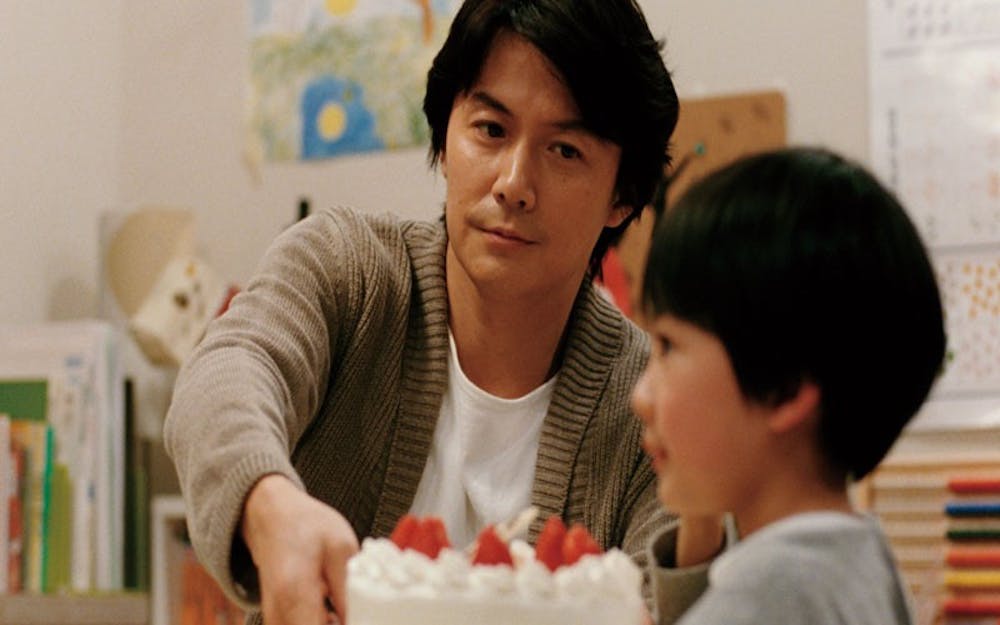Japanese film proves slow yet thoughtful
The Japanese drama “Like Father, Like Son” tells the story of two families that have their lives drastically altered, and the movie played well enough at the Cannes Film Festival in 2013 to win the Jury Prize. Ryota Nonomiya (Masaharu Fukuyama) is a straight-laced, upper-class architect who makes work his top priority. His wife Midori (Machiko Ono) wishes he would spend more time at home, especially with their six-year-old son Keita (Keita Nonomiya).
Ryota keeps Keita diligent and disciplined; he wants him to maintain his excellence in school and practice the piano, even though he is not very good at it. He tries to ingrain in him a sense of pride and determination. Ryota did not have a healthy relationship with his own father growing up, and he wants his son to be independent and do something with his life. Pushing him so hard to succeed makes his son have trouble connecting with his father emotionally. He is afraid to be a child and to have fun.
One day the Nonomiyas receive a phone call from the hospital where Keita was born. They have news so serious that they insist on telling them in person. When they arrive at the hospital, another couple is present, Yudai (Rirî Furankî) and Yukari (Yôko Maki) Saiki. The hospital representatives inform the couples that they believe their children were switched at birth.
The child the Saikis have been raising for six years, Ryusei (Shôgen Hwang), is actually the Nonomiyas biological son, and Keita is the Saikis’. During the following months of their lives, the families must decide whether they will keep the children they have raised or switch the children and start over with their biological children.
The Saikis are a working-class family with two other children, a girl and another boy. The father, Yudai, works at a shop, but his income is far beneath that of Ryota. Yudai spends much more time with his children and behaves like a child himself when playing with them. The couples agree to meet after the initial shock that brought them into each other’s lives. They meet at an indoor children’s playground with restaurants surrounding the equipment. Yudai rolls around on the floor and plays with the children as if he is an equal. He even splurges on the food because the hospital will foot the bill for all the expenses racked up during these meetings. Ryota sits on the side and looks at this grown man, an adult a few years older than him, playing in a ball pit. It makes him question whether he wants the child he has raised for six years to go live with this man. The families become connected, and they gradually have the two sons stay over for extended amounts of time to test the waters. They tell the boys it is just a sleepover and downplay the true nature of the visits.
The Japanese filmmaker Hirokazu Koreeda (“Nobody Knows,” “I Wish,” both on Netflix streaming) has deftly written and directed a perceptive drama that captures parenthood in modern Japan. The plot device is solely an excuse to bring into conflict two different classes of people that would not regularly interact, let alone become so integral in each other’s lives. The acting seems almost non-existent, a huge compliment because the performances seem so natural and effortless that nobody appears to be acting. The children are especially strong. Koreeda must have made them completely comfortable on set because they talk and interact with the adults as if there were no cameras on. Without believable child performances, the film would become cloying.
Big, noisy comic book films and car chase films are fine, but small, intimate films such as “Like Father, Like Son” leave the viewer with something. It has the power to move and to arouse empathy. It puts the viewers in someone else’s shoes and takes them through an emotional experience. Too often the big studio films are only, as William Friedkin once said, “Opium for the eyes.” They are a sensory experience, like fairground rides, that rouse the viewers during their running time but leave no lasting impact. Mindless fun is important every so often, but life and film should be more. Koreeda makes films that soothe the soul and that matter.

